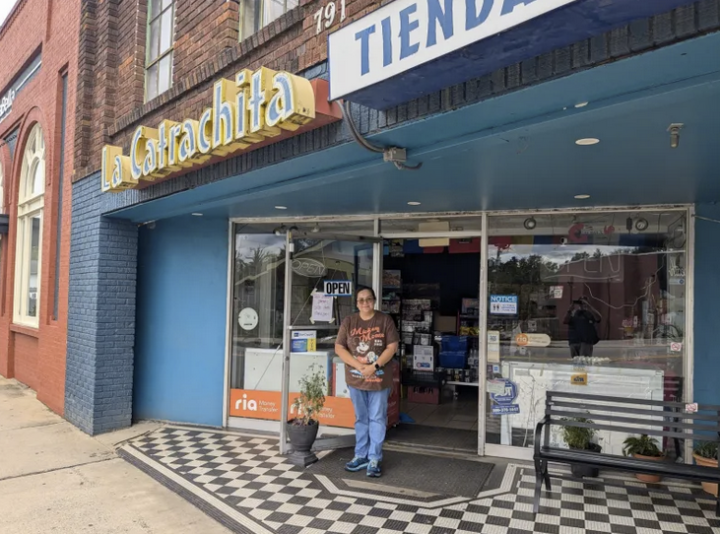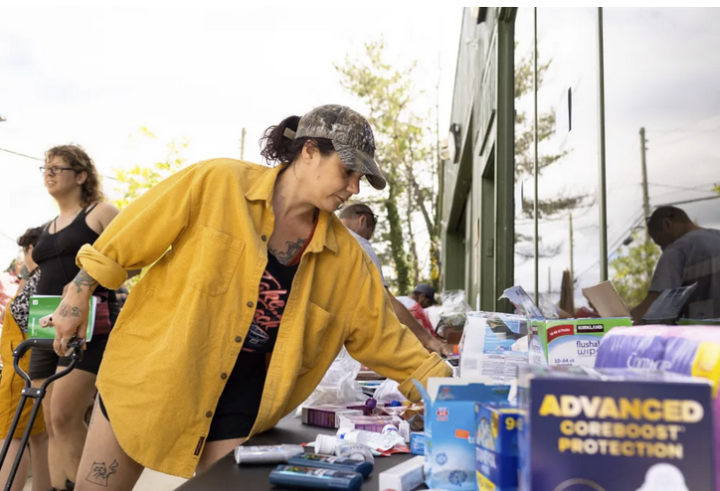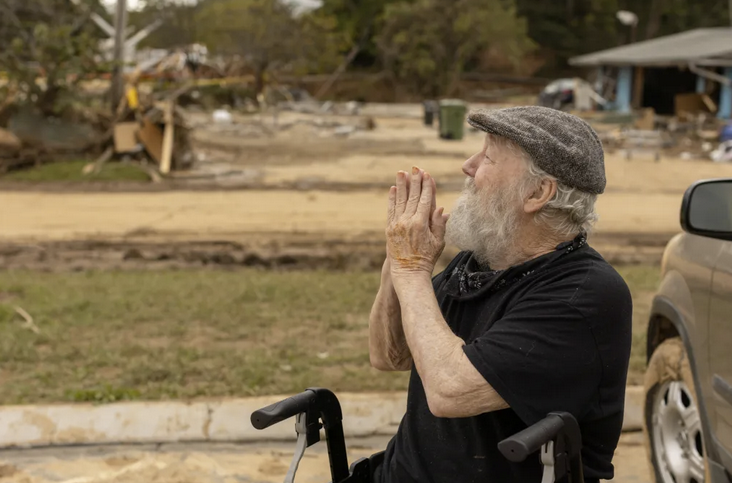by Jack Igelman, Carolina Public Press
A long line stretched from Sunny Point Cafe on Haywood Road in West Asheville at 10 a.m. Tuesday, days after Tropical Storm Helene swept through the area with devastation on Friday.
The line curved from the restaurant’s front door, thought the small parking lot and around the corner down State Street. Each person waited for a plate of food and an orange juice.
Among the crowd was Ashley Sindelar.
Her workplace, a veterinary hospital, was hit hard by Tropical Storm Helene and unable to operate. Despite the long line she was upbeat and grateful for a meal from her favorite breakfast spot.
“We’re really fortunate that our home is OK,” she said. “We don’t have electricity or water, but our community has really come together.”
Many others in Asheville and throughout the region are also without warm showers, medication, cool refrigerators, hot meals and other essentials while coping with the aftermath of Helene.
In spite of the challenges, businesses, volunteers, coffee shops, breweries, churches and public spaces along Haywood Road in West Asheville have provided relief and the one-mile long business district has become a refuge for people throughout the area.
The street is West Asheville’s main thoroughfare, a neighborhood packed with hip restaurants, shops and bars about three miles from downtown Asheville.
Several blocks west of Sunny Point Cafe, Yanira Molina swept the front of her mother’s small grocery, La Catrachita. Still without power, earlier Tuesday Molina handed out free bundles of bananas.
Their business was among the first to open on Saturday following the storm.
The clients of their business are typically among the Hispanic community. However, since they reopened after the storm the store has attracted customers who aren’t regulars.

“It was crazy,” she said. The store quickly sold out of water and other essentials, providing goods to many who were unable to pay in cash. “We have to stick together right now.”
The two-lane roadway is typically bustling near the tienda, Haywood Road’s epicenter.
However, since the storm, the hub of activity has shifted several blocks west to Asheville’s Fire Station #6.
A diverse cross section of residents were clustered on the front lawn and neighboring public library connecting to Wi-Fi throughout the day. Some say in lawn chairs typing on laptops.
Throughout the day, there’s an unusually steady stream of cars, pedestrians and cyclists.
A block further west of the fire station, Firestorm, a cooperatively run bookstore hosts a daily 2 p.m. meeting to share information.
“Pretty quickly people started showing up here looking for information and bringing supplies they had to share,” said Libertie Valance, one of Firestorm’s operators, who uses plural pronouns.
“We started setting up tables and since then it’s become more formalized.”
They are also directing aid to public housing, where there’s “been very little relief and where a lot of people don’t have transportation,” Valance said.
Prior to the afternoon meeting, dozens picked from tables of canned goods, cases of water and hygiene products.
At the store-front, a section of wall serves as a clearing house for information about missing people, events and updates about water, power and food.

“It’s been really cool to see everybody showing up with what they’ve got and figuring out how to make it through,” they said. “We’re trying to be a container and to help keep things orderly.”
In addition to food and water, people have provided medical care, bike repair and other services. A blue water barrel is replenished by Mateo Ryall with spring water transported from his land on nearby Spivey Mountain.
“Water is essential for life,” he said. “It made sense with my skill and know-how and access to help people get potable water for cleaning and cooking. I’m just here trying to help where there’s a need.”
Relief is also available in a parking lot at the Canterbury Classical School near the Interstate 240 interchange where seven-year old Thiago interprets for his mother, Lady Melo. The two have a bag of goods they’ve collected from a row of fold out tables covered with water, batteries, food cans, and snacks.
Originally from Colombia, their home in Swannanoa, among the hardest hit places in the region, was destroyed during the storm.

“I’m sad,” Lady Melo said in Spanish. “But we are lucky.”
Wearing a yellow cap and a clerical collar, Redeemer Anglican Church priest Gary Ball, the school founder, explained his focus is helping people get through the moment.
“No matter if you’re impoverished or upper middle class, we are all desperate for the same things. Not knowing the extent of what happened and then getting it in pieces is the biggest challenge,” he said as tears welled in his eyes.
“It’s hard. It doesn’t feel like it’s real.”
There is however, along a roughly one-mile stretch of West Asheville, an observable shared mission to collectively respond and adapt to the present challenge and horrors unleashed by an unfathomable tragedy still unfolding.
At 7 p.m., Firestorm was empty and silent, but a rock trio was blaring tunes next door while several dozen boisterous people sat at long tables sipping lagers and ales from green and red plastic cups at Diatribe Brewing Company.
As the citywide 7:30 p.m. curfew approached Tuesday, there seemed to be a fleeting moment of joy as darkness settled over a city transformed.
This article first appeared on Carolina Public Press and is republished here under a Creative Commons license.




Before you comment
The comments section is here to provide a platform for civil dialogue on the issues we face together as a local community. Xpress is committed to offering this platform for all voices, but when the tone of the discussion gets nasty or strays off topic, we believe many people choose not to participate. Xpress editors are determined to moderate comments to ensure a constructive interchange is maintained. All comments judged not to be in keeping with the spirit of civil discourse will be removed and repeat violators will be banned. See here for our terms of service. Thank you for being part of this effort to promote respectful discussion.